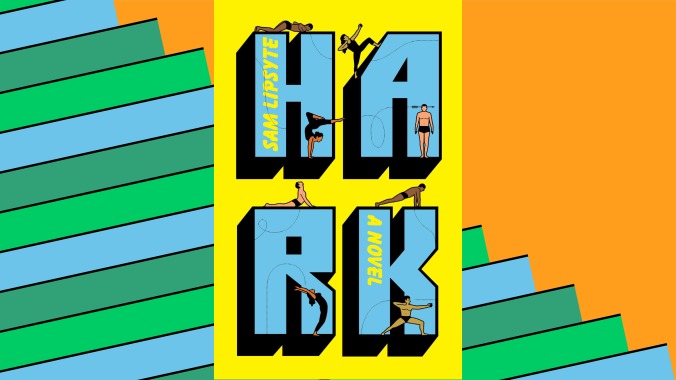“Every age gets the savior it deserves,” Sam Lipsyte writes late in his fourth novel, Hark. Born in 1968, Lipsyte grew up during the era of Kool-Aid cults and sannyasin sects. He attended college in the decade when greed was God, and published his first novel, The Subject Steve, on that terrible Tuesday when suicidal martyrs and heroic first responders rose to the stature of saints. Lipsyte has earned a following for his equally bleak and comic social satires during the age when we elect our saviors, and all their promises of hope and greatness, to the nation’s highest office.
In need of saving in Hark is a world in which the apocalypse approaches, where Obama served only a single term and an Army of the Just battles Armies of the Market for control of Europe. Descending on a cloud of wellness woo-woo, enters Hark Morner. A failed stand-up comic-turned-reluctant mindfulness messiah, he is a green and gold-eyed, Goop-souled Svengali, a “secret celebrity to celebrities” whose Mental Archery practice is a mishmash of New Age mysticisms. Like many of Lipsyte’s best characters, Hark is sketched in both broad strokes and absurdist subtleties that, when combined, ring hysterically and heartbreakingly true.
Hark spreads the power of focused thinking in pamphlets and office workshops. He survives on cupfuls of ice and abstains from the “flesh and fluids” of the carnal life. He leads his Harkist devotees through yogic, bow-and-arrow poses like Rainforest Hunt, Encircling Sioux, Agincourt, and Priapic Centaur, and builds a following delivering ouroboric mantras that sound ripped straight from the social media drivel posted by the world’s countless Thích Nhất Hạnh wannabes. “You are the arrow, and the trees the arrow speeds past, and the past the arrow speeds toward,” he says. And: “One shoots where the stag, the target, one’s chance for fulfillment, are about to appear. You lead your prey. You don’t dress for the job you want. You dress for the job your child will someday be denied.” And: “Archery is a metaphor. We could easily be talking about volleyball, or handcrafted butterscotch.” And: “You need to remember that I don’t have a message. I just want people to focus.” Focus on what, exactly? his followers ask. “Focus on focus on focus.”
Unfortunately, Lipsyte focuses too much of the novel on Hark’s braintrust at the Institute For Mental Archery, his “foragers for the nuts and berries of transcendence.” Their names—Fraz Penzig, Teal Baker-Cassini, and Tovah (who Lipstyte fans might remember from two short stories in his collection The Fun Parts)—are often more interesting than their exploits. Half-drawn true believers, there’s not a Ma Anand Sheela or St. James The Greater in the bunch. They’re vehicles for Lipsyte’s madcap brand of humor, which too often here misses the mark. A yogi would say that these jokes, involving ass worms, sour cherry soup, and the 1980s New York Jets’ defensive line, are not grounded, not connected or in service of the story and its characters.
But for all their blandness, this core group of Harkists reveals the blessing and the curse that accompanies our age’s obsession with the secularized meditation practice commonly known as mindfulness. For these characters, focusing on focus becomes as oppressive as the 12-hour workday (no wonder similar mindfulness techniques have found a niche for improving productivity in workspaces and classrooms).
By the book’s Chekhovian climax—if an imaginary arrow appears in act one, you can be sure a real one will find its target in act three—only Hark comes to realize that by centering on the well-focused self, we neglect to focus on the world. “About mental archery. I was wrong,” Hark concedes. “It’s got to be more… Maybe not heaven on earth. But something.” Something like focusing on ending poverty, patriarchy, and oppression in all its forms. Focusing on the slow, planetary death known as climate change. Focusing on focusing on others.

